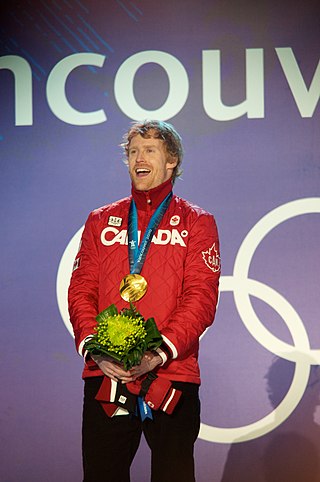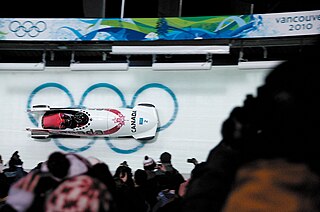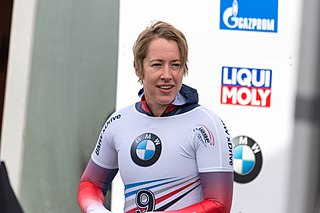
Bobsleigh or bobsled is a winter sport in which teams of 2 to 4 athletes make timed runs down narrow, twisting, banked, iced tracks in a gravity-powered sleigh. International bobsleigh competitions are governed by the International Bobsleigh and Skeleton Federation.

Skeleton is a winter sliding sport in which a person rides a small sled, known as a skeleton bobsled, down a frozen track while lying face down and head-first. The sport and the sled may have been named from the bony appearance of the sled.
Kristan Bromley is a retired British skeleton racer who has competed since 1996. He won the gold medal in the men's event at the 2008 FIBT World Championships in Altenberg, Germany. This was Great Britain's first gold medal at the FIBT World Championships since 1965.

Martins Dukurs is a former Latvian skeleton racer, currently a coach, who has competed since 1998. He is a six-time world champion in men's skeleton, a double Olympic silver winner, and the athlete with the most World Cup titles with a total of 11, having won eight consecutive titles between 2010 and 2017, plus another three consecutive titles between 2020 and 2022.

Tomass Dukurs is a Latvian skeleton racer who has competed since 1998. Competing in three Winter Olympics, he finished fourth in the men's skeleton event at Vancouver in 2010 and Sochi in 2014.

Mellisa Hollingsworth is a retired Canadian athlete who competed from 1995 to 2014. She won the bronze medal in the women's skeleton event at the 2006 Winter Olympics in Turin.

Noelle Pikus-Pace is an American retired skeleton racer who began her career in 2001. She won five medals at the FIBT World Championships, competed in the 2010 Winter Olympics in Vancouver, and won the silver medal in the 2014 Winter Olympics in Sochi.
Michelle Kelly is a Canadian former skeleton racer who competed from 1994 to 2013. A two-time Olympian, Kelly is largely considered to be one of the pioneers of the sport of Women's Skeleton. Originally an elite gymnast, she was recruited for her explosive power to the Canadian Women's National Bobsleigh Team as a brakeman, competing from 1994 to 1999. In 1995 Kelly started sliding Skeleton and competing in both sports. When Women's Skeleton and Bobsled were both named to make their debut at the 2002 Winter Olympics in Salt Lake City, Kelly chose Skeleton. She finished 10th at those 2002 Games, and went on to earn the Olympic alternate position at the 2006 Torino Olympics, and another Olympic birth at the 2010 Winter Olympics, finishing 13th. Kelly won a complete set of medals at the FIBT World Championships with a gold in 2003, a silver in 2008, and a bronze in 2005, as well as taking the women's Skeleton World Cup overall title in 2002-3.
The FIBT World Championships 2008 ran February 11–24, 2008 in Altenberg, Germany for the fifth time, having done so in 1991 (bobsleigh), 1994 (skeleton), 1999 (skeleton), and 2000. It is the first time Altenberg has hosted all of those events at one championship, and also includes the mixed team event that debuted at the 2007 championships. Training for the events took place February 12–14 for two-man and two-woman bobsleigh, and February 19–20 for skeleton and four-man bobsleigh.
The FIBT World Championships 2011 took place 14 February – 27 February 2011 in Königssee, Germany, for the fifth time, doing so previously in 1979, 1986, and 1990 (skeleton), and 2004. In 2007, the championships were awarded to Cortina d'Ampezzo, Italy over Winterberg Germany, but Cortina withdrew in February 2009 to a series of issues.

Jonathan Riley "Jon" Montgomery is a Canadian skeleton racer and television host. He won the gold medal in the men's skeleton event at the 2010 Winter Olympics in Vancouver, British Columbia. Despite hosting The Amazing Race Canada since 2013, he is best known in Canada for his spontaneous celebration after winning the gold medal in 2010, when he was caught on camera being handed a pitcher of beer by a fan while a crowd surrounding him cheered and sang O Canada. Writing for CBC in 2020, Montgomery stated "If the beer is all I’m ever remembered for, I consider myself the luckiest fella on Earth."

Justin Kripps is a Canadian bobsledder and an Olympic champion in two-man bobsleigh following his gold medal win at the 2018 Winter Olympics in Pyeongchang, South Korea. Kripps won a silver medal in the two-man event at the 2017 World Championships and a bronze in the mixed team event at the 2012 World Championships. He has competed in the sport since 2006 and has many World Cup podiums. During the 2017–18 Bobsleigh World Cup, he finished the season first in the two-man and overall, to win the Crystal Globe as overall champion.

The Whistler Sliding Centre is a Canadian bobsleigh, luge, and skeleton track located in Whistler, British Columbia, that is 125 km (78 mi) north of Vancouver. The centre is part of the Whistler Blackcomb resort, which comprises two ski mountains separated by Fitzsimmons Creek. Located on the lowermost slope of the northern mountain, Whistler Sliding Centre hosted the bobsleigh, luge, and skeleton competitions for the 2010 Winter Olympics.

Kaillie Humphries is a Canadian-American bobsledder. Representing Canada, she was the 2010 and 2014 Olympic champion in the two-woman bobsled and the 2018 Olympic bronze medalist with brakewoman Phylicia George. With her victory in 2014, she became the first female bobsledder to defend her Olympic title and was named flagbearer for the Olympic closing ceremony with brakewoman Heather Moyse.
The skeleton competition of the Vancouver 2010 Olympics was held at Whistler Sliding Centre. The events were held between the 18 and 19 February 2010. This event was expanded to four runs over two days beginning at these Olympic Games.

The four-man bobsleigh competition at the 2010 Winter Olympics in Vancouver, British Columbia, Canada, was held at the Whistler Sliding Centre in Whistler, British Columbia, on 26–27 February. The German team of André Lange, René Hoppe, Kevin Kuske, and Martin Putze were the defending Olympic champion in this event. America's team of Steve Holcomb, Justin Olsen, Steve Mesler, and Curtis Tomasevicz were the defending world champions in this event. The test event was won by the Latvian team of Jānis Miņins, Daumants Dreiškens, Oskars Melbardis, and Intars Dambis. The last World Cup event prior to the 2010 Games place took place in Igls, Austria on 24 January 2010 and was won by the German team of Lange, Hoppe, Kuske, and Putze. Holcomb of the United States won both the four-man and the combined World Cups.

The two-woman bobsleigh competition at the 2010 Winter Olympics in Vancouver, British Columbia, Canada, was held at the Whistler Sliding Centre in Whistler, British Columbia, on 20–21 February.

The men's skeleton event at the 2010 Winter Olympics in Vancouver, Canada, took place at the Whistler Sliding Centre on 18–19 February. Canada's Duff Gibson was the defending Olympic champion. Gibson retired after the 2006 Olympics. Switzerland's Gregor Stähli, the defending Olympic bronze medalist was the defending world champion, but did not compete due to a thigh injury sustained during the World Cup event in Lake Placid, New York, on 20 November 2009. The test event held at the venue was won by Jon Montgomery of Canada. The last World Cup event prior to the 2010 Games took place in Igls, Austria, on 23 January 2010 and was won by Latvia's Martins Dukurs who also won the overall World Cup title.

The women's skeleton event at the 2010 Winter Olympics took place at the Whistler Sliding Centre on 18–19 February. The competition was won by British athlete Amy Williams, who set new course records for the track on her first and third runs. Williams, who had never before won a World Cup or World Championship event, became the first British athlete to win a solo Winter Olympic gold medal in 30 years. German sliders Kerstin Szymkowiak and Anja Huber won the silver and bronze medals respectively. Williams' teammate Shelley Rudman, who had won the silver medal at the 2006 Winter Olympics, and Canadian Mellisa Hollingsworth, both of whom had been expected to be in medal contention, were disappointed.

Elizabeth Anne Yarnold, OBE is a British former skeleton racer who joined the Great Britain national squad in 2010. With consecutive Olympic gold medals in 2014 and 2018, she is the most successful British Winter Olympian and the most successful Olympic skeleton athlete of all time from any nation. She won the 2013–14 Skeleton World Cup, followed by a gold in the 2014 Winter Olympics in Sochi. Yarnold was selected to be one of the two women skeleton drivers representing Team GB at the 2018 Winter Olympics in Pyeongchang, and went on to become the first person to defend an Olympic gold in skeleton and the first British athlete to defend a Winter Olympic title. Yarnold set the track record for women's skeleton at the Olympic venue in the final heat of the race with a time of 51.46 seconds, beating Jacqueline Lölling's pre-Olympic record by nearly 1.3 seconds and her own first-heat record by 0.2 second. Yarnold was also the flag bearer for Great Britain at the Pyeongchang opening ceremony.














